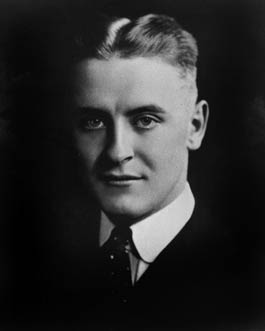home | north bay bohemian index | the arts | books | review

Dipsomania! Of course Fitzgerald drank. He had Gatsby rattling around up there.
Words of Warning
So you wanna be a writer? Well listen now, to what I say.
By Hannah Strom-Martin
As someone who frequently announces her literary aspirations in order to feel she has somehow separated herself from the herd, I have received every response from naked indifference to the enthusiastic, "Oh, really? I'd love to write!"
It's this last response I really worry about. Lots of people think of writing as a peaceful pastime, a communing with the muse. In truth, writing is a lot less Jo March in Little Women and a lot more Myles from Sideways. There's plenty of wine and partying to be had, but most of it is to drown the pain that sitting alone in a small room staring at a computer screen simply cannot fail to bring.
If you're anything like me, by the time you get to your first writing conference, your social skills will have withered so abominably from lack of human contact that you will more likely than not drink heavily and end up nearly kicking a more illustrious writer square in the ass. (My near victim was Peter Straub--author of the recent Lost Boy, Lost Girl and co-author, with Stephen King, of The Talisman and Black House. Luckily his back was turned when my foot strayed near his rump, but it was rather a shock when a friend informed me of his identity.)
It's no coincidence that Kay Redfield Jameson's brilliant book Touched with Fire: Manic Depressive Illness and the Artistic Temperament is mostly concerned with the woes of writers. From Byron to Woolf, nearly every great writer has suffered from some form of self-destructive mania. Each malady is particular to the artist and spawned by a number of different factors, but you can bet the farm that chief among them is writing's characteristic solitude. Stephen King and a host of other successful novelists will tell young aspirants to "write with the door closed," advice both excellent and terrifying. Artistic people are already half out of their minds, many of them suffering from chronic sensitivity to the human condition.
Indeed, writers think too much. It's part of the job. Plot, character, moral, metaphor--these are the names of our demons. For years before I attended my first real writing workshop, I was convinced that I knew what I was doing. In truth, I had about as much talent as Comic the Insult Dog. The first thing I turned in was a chapter of the novel I'd been working on since grade school (most writers have one and, hence, have earned their reputation as real dorks). The instructor had circled every reference to eyes I'd made--about a dozen a page. I'd been using "the gaze" as the way into my characters' moods and expressions for years without ever knowing it. If I couldn't find a different mode--or even physical feature--with which to describe my characters' experiences, my plotting was little better.
These are the little nagging things about writing that no one who hasn't written before ever thinks of. It's the kind of stuff that keeps me mentally bitch-slapping myself as I write, which leads to all sorts of other inner criticisms and hence in turn leads to bad drinking decisions ending with a foot up a prominent author's derriere. Is it a wonder Fitzgerald became a dipsomaniac, what with the intense metaphor of Gatsby running through his head? Or that Dorothy Parker's manic witticisms drove her to attempt every form of suicide known to man?
A writing instructor once tragically announced, "My story needs Truman Capote. It's got me." Until an aspirant has made that realization, I don't consider her a true writer. Pop culture tends to paint writers as omnipotent gods, or at least people who know what the hell they're doing. This is, of course, to say nothing of compiling rejections, holding down retail jobs to pay the bills or missing out on the television premiere of Sweet Home Alabama in favor of being locked in a dark closet with a laptop.
All scary to be sure, but it's nothing compared with the demons created when struggling to discover just where the story is going and why anyone should be so willing to follow. How does the cool character invented on page X fit into the exciting climax devised with some other character in mind? How to graft another character into a different story while desperately trying to save something of an idea that no longer works? Can such an existential problem even be discussed with significant others without them having you committed like a crazy person?
If you want to know the answers to these questions, then go ahead--be a writer. But don't say I didn't warn you.
Send a letter to the editor about this story.
|
|
|
|
|
|